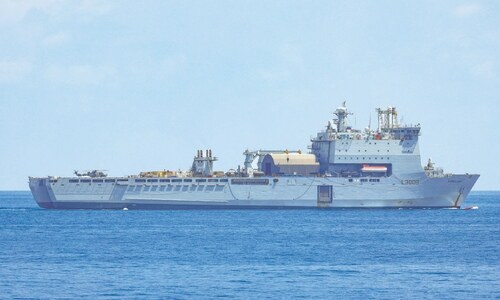EUROPE-AFRICA relations are a work in progress. Often testy and difficult, and now dominated by the “migrant crisis”, Europe and Africa are once again engaged in a brave attempt to reset their relationship — but history, geography and demography keep getting in the way.
Both sides want to focus on the future but it’s not easy to forget the past. Whether it demands for the return of Africa’s art which was stolen and plundered as part of the “Scramble for Africa” or the controversy over colonial era statues in European capitals, history keeps barging into the Europe-Africa relationship.
Europeans of Africa descent are only just getting serious attention. African-Europeans continue to experience some of the highest rates of discrimination in Europe, and the refugee crisis has made things even worse, according to the European Network Against Racism (ENAR).
As highlighted by the recent EU Week for People of African Descent held at the European Parliament, the struggle for equality and inclusion is by no means over. It’s time European policymakers start walking the talk on ending discrimination.
And then there’s geography. Europe and Africa are neighbours, separated by a small stretch of sea which as refugees and migrants have illustrated can be crossed in ramshackle boats — even if such journeys end in tragedy and death.
Being neighbours also brings responsibilities, the obligation of looking after each other, especially when times are bad. Europe has certainly provided aid to African governments through panoply of long-term and emergency assistance packages, trust funds and aid benefits. However, the assistance has also often gone astray, ending up in the hands of corrupt and unscrupulous leaders, with African people seeing little benefits.
And then there’s the demographic challenge. Ageing Europe and youthful Africa could be a partnership made in heaven. But the reality of populism, xenophobic politics and racism are difficult obstacles to overcome.
Still, much has changed in Europe and Africa since the first Europe-Africa summit was held in Cairo in 2000. With migration issues now top of the EU agenda, Africa is once again in the spotlight as European governments seek to curb the massive arrival of young Africans.
Investing in Africa is not just about stopping migration, however. With its young population, access to technology, improvements in infrastructure, health and education, Africa is on the cusp of a new, more dynamic, era. With the right policies and an emphasis on good governance, Europe can help ensure that change and transformation in Africa happens faster.
Here are key developments which demand stronger European attention:
- Keep an eye on Agenda 2063, adopted by the African Union in 2013 and its vision of “an integrated, prosperous and peaceful Africa, driven by its own citizens and representing a dynamic force in the international arena”. Certainly, there is a benefit in meetings such as the recent one in Brussels between the European Commission and the African Union Commission.
But EU policymakers must listen equally carefully to the voice of African civil society representatives, including business leaders, parliamentarians, local authorities, young people and women. Their views are of key importance if Africa-Europe relations are to thrive in a rapidly-transforming world.
- Focus on Africa’s digital industries. Digital Africa is a reality. Africa is in the throes of an amazing and transformative technological revolution, as its population leapfrogs computers in favour of internet connections through mobile phones. About a fifth of the continent now has access to a broadband connection, a figure predicted to triple in the next five years.
Also, far from being passive bystanders, Africa’s youth are poised to drive massive digital innovation, creating more employment and growth. Across the region, businesses and governments are taking steps to ensure Africa can compete in the digital age. As it changes the way people live and work, digitalisation is expected to bring an additional $300 billion to Africa by 2026.
As handsets and data become more affordable, greater accessibility to mobiles — which have outpaced other forms of communications infrastructure on the continent — is changing the way in which public services are delivered and business and politics are being conducted. Digitalisation is a boon to ensuring good governance.
- Pay attention to African women. Africa leads the world in the number of women starting businesses, according to the Global Entrepreneurship Monitor. Many experts, including the World Economic Forum and the World Bank, believe that the 21st century is Africa’s century and that its economic future is dependent on the success of women entrepreneurs.
However, these same experts and the Center for Global Enterprise agree that women entrepreneurs in Africa face barriers — including unequal access to finance — that threaten to stifle innovation and slow the growth needed to propel their businesses and local economies. These challenges include:
Finally, don’t disregard Africa’s efforts to build a pan-African common market. The agreement on setting up an African Continental Free Trade Area (AfCFTA) last March in Kigali may seem like so much wishful thinking given the lack of progress in dismantling intra-African barriers to trade — but the 44 African leaders who have signed up to the deal are serious about the plan.
Over the coming years, they will be reducing duties and tariffs, easing the movement of people, goods, and services between African countries, and harmonising trade policies with the hopes of expediting regional integration, boosting intra-African trade, and, ultimately, increasing Africa’s share of global trade. The EU can provide help and expertise just as it does currently to the Association of Southeast Asian Nations (Asean).
—The writer is Dawn’s correspondent in Brussels
Published in Dawn, June 2nd, 2018
















































Dear visitor, the comments section is undergoing an overhaul and will return soon.